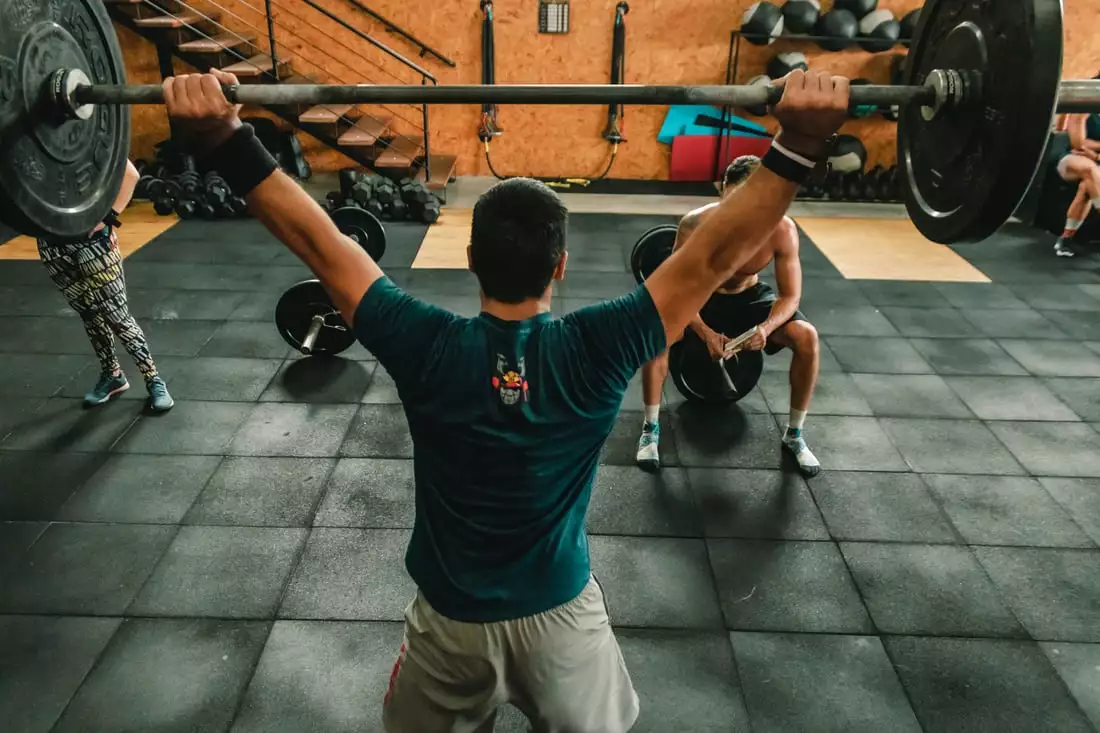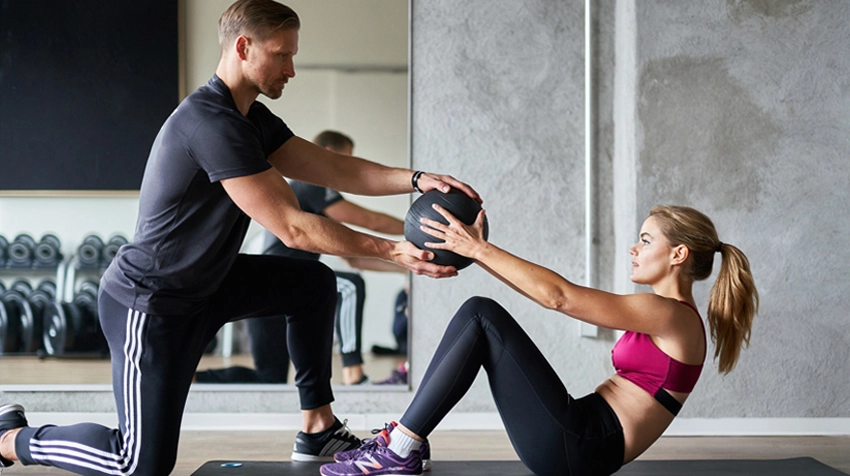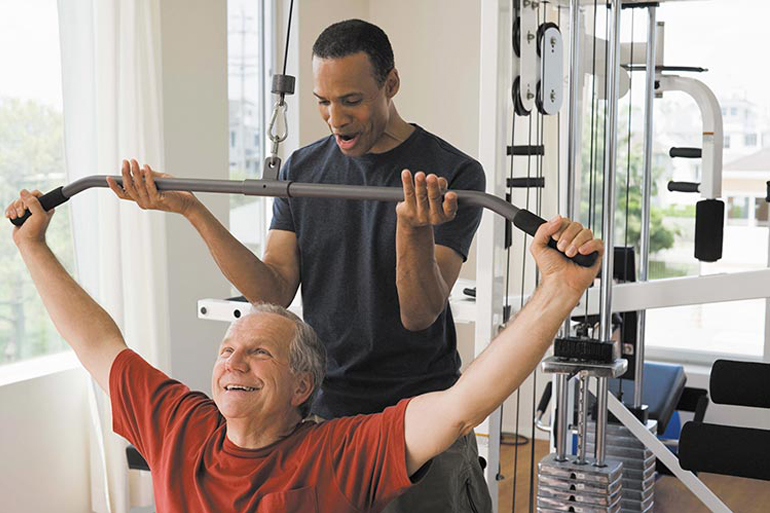
- info@fitindiatrust.org
- +91-7999567519

8 Essential Skills You Learn in a Fitness Trainer Course
With the advent of new healthcare technologies, people are becoming more conscious of their well-being. In the last decade, the demand for fitness trainers has skyrocketed, especially in India. If you are considering a career in the fitness industry, now is the perfect time.
Did you know? The global fitness movement has been growing at an annual rate of 4.4%, with more than 740,000 personal trainers worldwide.
Becoming a successful fitness trainer requires specific skills and knowledge of body anatomy. These skills are required to become a successful fitness trainer and heighten your career. A fitness trainer course provides all the crucial capabilities needed to build a successful career as a fitness trainer.
1. Understanding Human Anatomy and Physiology
The first two and most essential things you will learn in your fitness trainer course are:
-
Human Anatomy
-
Physiology
These aspects teach you how the body works, which muscles are activated for different exercises, and how to avoid injuries. This knowledge becomes essential in creating safe and effective workout plans. Good anatomy and physiology knowledge will allow you to customize workout plans for your clients based on their needs and ensure maximum safety and effectiveness.
For example, understanding how the shoulder joint moves helps you create exercises that will not strain this delicate area. This is especially important when working with clients who have injuries or want to emphasize certain parts of their bodies.
2. Nutrition and Diet Basics
A human body cannot achieve the best results by following a fancy diet or just exercising. Diet and workout are just one side of the coin when it comes to being fit. Therefore, it is essential to combine both to get the best results and help your clients achieve their fitness goals.
A fitness trainer course will assist you in:
-
Learning the basics of nutrition.
-
How carbohydrates, proteins, and fats affect energy levels and muscle recovery.
-
Creating a balanced meal plan to support your client's fitness goals.
-
Understand food labels, choose nutrient-rich foods, and make better food choices.
3. Client Assessment and Goal Setting
Before devising a workout plan, it is essential to determine your client's current fitness level. The fitness trainer course will help you perform thorough assessments to determine your strengths, weaknesses, and fitness goals.
The foundation for developing a personalized workout plan is to know where they start.
-
Does your client want to lose weight?
-
Do they want to run a marathon?
-
Are they trying to gain muscle or increase flexibility?
Once you assess your client, you will know their realistic and achievable goals. 'Motivation is the key'; for a beginner, the goals might be smaller and more manageable to build confidence, whereas experienced athletes may require more challenging goals to push themselves to their limits.
The right goals set the client to be motivated and focused. The ability to monitor client advancement is crucial for their success.
4. Exercise Programming and Technique Mastery
A fitness trainer course teaches you to develop exercise programs that match your client's requirements. Your training programs should focus on individual needs like:
-
Strength development
-
Endurance training
-
Flexibility exercises
Proper exercise technique is essential for maximizing results and avoiding injuries. The course will teach you to create an exercise regime for your clients and the correct posture to follow while performing an exercise. You will learn to break the exercises into smaller steps so clients can easily understand and follow through.
5. Motivation and Communication
The job of a fitness trainer is not just about instructing clients how to exercise. It is also about motivating and encouraging them, which can be achieved through effective communication.
This can be achieved by:
-
Listening to your clients
-
Understanding their challenges
-
Giving them a helping hand when required
Great trainers know how to communicate in a way that will get the client through the challenging moments. Your communication skills significantly affect whether someone hits a new personal best or stays optimistic about their progress.
Learning to convey messages will help motivate clients and maintain open and supportive communication, strengthening the connection and ensuring long-term success.
6. Group Training and Class Management
If you want to teach group fitness classes, the skills you gain on your fitness trainer course will prove invaluable. It is a challenging but rewarding task.
You will learn:
-
How to design workouts for beginners and experienced participants?
-
How to motivate a group of people and keep them engaged?
There is nothing like group classes to reach more people and help them get in shape in a fun, energetic environment. Your acquired skills enable you to deliver training to individual clients as well as group fitness sessions. Whether leading a yoga, spin or boot camp class, you can adjust exercises to fit various fitness levels and offer modifications when needed.
7. Business and Entrepreneurial Skills
Most fitness trainers work for themselves or own their businesses. To become an entrepreneur in the fitness industry, you will need more than technical knowledge; you need business skills.
Your fitness trainer course will teach you to manage:
-
Your schedule
-
Your finances
-
How to market your services
In this digitalized world, building an online presence and brand is the key to getting clients. Gaining business and entrepreneurial skills will help you set up your fitness business, market yourself, and form client relationships.
8. Certification and Specializations
After completing your fitness trainer course, you will be certified to work as a certified personal trainer. It will give you a competitive edge in a crowded market if you specialize in strength training, yoga, pilates, or pre/postnatal fitness.
Upgrading your knowledge and acquiring further certifications will help you:
-
Expand your expertise
-
Serve a broader client base
Professional certificates are necessary as they present new career opportunities and higher earning potential. Additional certifications will increase your working skills and qualifications, no matter what type of clients you want to work with, whether athletes, seniors, or clients with specific health needs.
Conclusion
A fitness trainer course gives you the knowledge and skills to become an effective and successful trainer. You will learn anatomy and nutrition, client motivation, and business skills to help clients achieve their fitness goals. The career of fitness trainers is exciting and offers many opportunities, as the demand for fitness trainers is growing.
Becoming a fitness trainer is fulfilling and rewarding if you are passionate about fitness and helping others lead healthier lives. Turn your passion into a successful career and start your fitness career today!
FAQs
1. How long is the fitness trainer course?
Essential certifications for this course last 6 weeks to 3 months. The time may vary depending on the advanced programs or specializations. Pick a course that fits your schedule and career goals.
2. Do I need to have a degree to be a fitness trainer?
No formal degree is required. However, a recognized personal trainer course and certification are enough to begin the profession. At the same time, additional qualifications will help you understand more.
3. How much can a fitness trainer earn?
Earnings depend on experience, location, and services provided. In India, the average monthly income of personal trainers is ₹25,000 to ₹50,000. You can earn more with knowledge and specialization.
4. Can I work as an online fitness trainer?
Nowadays, many fitness trainers offer online personal trainer coaching. Video calls, fitness apps, and social media allow you to reach clients globally and provide personalized training programs.
5. What certifications can I pursue if I have completed a fitness trainer course?
Once you've completed your course, you can focus on areas like strength training, yoga, Pilates, or working with specific populations such as seniors or athletes. These certifications will help you to open new career opportunities and increase your earning potential.


